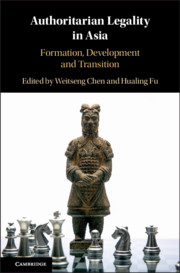
-
Select format
-
- Publisher:
- Cambridge University Press
- Publication date:
- July 2020
- July 2020
- ISBN:
- 9781108634816
- 9781108496681
- 9781009256513
- Dimensions:
- (228 x 152 mm)
- Weight & Pages:
- 0.75kg, 408 Pages
- Dimensions:
- (229 x 152 mm)
- Weight & Pages:
- 0.58kg, 408 Pages
You may already have access via personal or institutional login
Book description
A cluster of Asian states are well-known for their authoritarian legality while having been able to achieve remarkable economic growth. Why would an authoritarian regime seek or tolerate a significant degree of legality and how has such type of legality been made possible in Asia? Would a transition towards a liberal, democratic system eventually take place and, if so, what kind of post-transition struggles are likely to be experienced? This book compares the past and current experiences of China, Hong Kong, South Korea, Japan, Taiwan, Singapore, and Vietnam and offers a comparative framework for readers to conduct a theoretical dialogue with the orthodox conception of liberal democracy and the rule of law.
Contents
Metrics
Altmetric attention score
Full text views
Full text views help Loading metrics...
Loading metrics...
* Views captured on Cambridge Core between #date#. This data will be updated every 24 hours.
Usage data cannot currently be displayed.
Accessibility standard: Unknown
Why this information is here
This section outlines the accessibility features of this content - including support for screen readers, full keyboard navigation and high-contrast display options. This may not be relevant for you.
Accessibility Information
Accessibility compliance for the PDF of this book is currently unknown and may be updated in the future.


